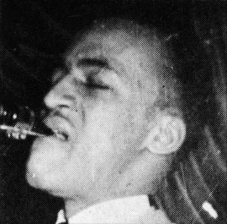
Revision note:We will be adding one more side on which Claude McLin played for the Allegro label, on a single by a singer named Chuck Castle.
Claude Johnson McLin Jr. was a tenor saxophonist of the purest Lestorian persuasion. According to the late Vernel Fournier, he even assembled his horn at an angle, as his hero was known to do.
Claude McLin was born on December 27, 1925 in Chicago; his parents were Claude McLin Sr. and Isabella Johnson McLin. (On his 1942 application for a Social Security number, he gave his and his father's middle name as "John," but this appears to be an anomaly. Other sources have said his middle name was Jonathan. However, in the high school graduation records kept by the Chicago Board of Education, his middle name is given as Johnson.) He attended DuSable High School, and played in a Chicago-area "baby band" that was sponsored by Captain Walter Dyett.
He served in the Army from 1944 to 1946, and returned to Chicago after his discharge. From 1946 through 1951 he led a combo in Chicago bars and nightclubs. In 1952, he moved with his family to Los Angeles, where he remained an active musician through the mid-1960s.

The first documentation we have of Claude McLin's musical career comes from the Chicago Defenders of April 1st and 8th, 1944. These carried an advertisement for a show on April 9th, featuring Jesse "Crown Prince of The Trumpet" Miller and his Orchestra, Walter Dyett and his Orchestra and (Introducing to Bronzeville that Sensational Baby Band:) Levi Sayles and his Orchestra. Each member of Levi Sayles' band had his own photograph on April 1: Levi Sayles (prob. p); Kenneth Williams (tp); Benny White (tp); Herman Anderson (tp); Claude "McLinn" (probably ts); Keith Robinson (ts); "John Griffen" (just 15 years old, as or ts); Leo Cresswell; Lenear Bolden; Wilbur Campbell (d); Herbert Almo (we don't know which instruments Cresswell, Bolden, and Almo played--presumably two were trombonists and the third handled the string bass). On April 8, a separate photo of Johnny Griffin ran, with the blurb "Griffin is the youngest musician in professional circles and one of the best."
This battle of the bands event was presented by the Beau Brummels (the organization run by McKie Fitzhugh that had sponsored many appearances by King Fleming's big band in 1942 and 1943) and took place at the Parkway Ballroom. On Friday April 28, another battle took place there between Eugene Wright & his Dukes of Swing and Levi Sayles and his Baby Band. This one was presented by the Royal Sultans. The Levi Sayles band was one of several aggregations tutored by Walter Dyett.
Of this outfit Johnny Griffin told an interviewer:
I had played with [a] band called the Baby Band which was about a 14-15 piece band made [up] of my schoolmates and we played professional jobs around the South Side of Chicago (Jim Standifer, interview with John Griffin, October 30, 1982; http://www.umich.edu/~afroammu/standifer/griffin2.html)).
Griffin would leave the Baby Band later in 1944 to start his own sextet. Claude McLin graduated from DuSable on August 18, 1944; he probably had to go to summer school after cutting back his course load in the spring. On receiving his sheepskin, he was promptly drafted into the Army.
Claude's younger brother Edward Milton McLin was a member of the same DuSable High School band as Johnny Griffin (Ed played the French horn); see the Defender for April 28, 1945. Ed McLin and Johnny Griffin both graduated in June 1945. Ed picked up another mention in the Chicago Defender on October 6 of that year: "Edward Milton McLin... left September 23 for Frankfort, Ky. where he will attend Kentucky State college on a scholarship awarded him through Capt. Walter Dyett and the DuSable Alumni association. McLin is a June graduate of DuSable high school and the son of Mr. and Mrs. Claude J. McLin. He will be a member of the college band and major in music. While attending DuSable high school he played with several local bands in and around Chicago. At the time of his departure he was with the Sultans of Swing." Ed McLin's usual instrument was the trumpet; later, he would work with Claude's band on occasion (as we can see from photos taken in 1947 and 1948).
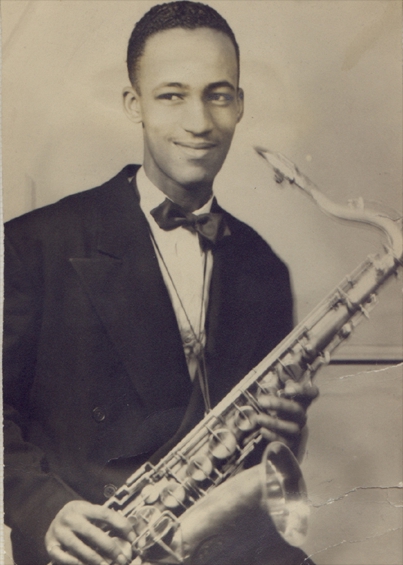
After returning from a little under two years of military service, Claude McLin was a busy man. He first appears in the historical record as a leader on August 1, 1946, when Musicians Union Local 208 accepted and filed a contract between "Claude J. McLinn" and the 308 Club, "3 days only"; another contract for a 3-day gig at the 308 was listed on August 15 (and this time they went to the trouble of spelling his name right). The promotional efforts of DJ and impresario McKie Fitzhugh would soon bring McLin steady coverage in the Defender. Claude's first appearance in the newspaper came in connection with a concert that Fitzhugh was promoting at the Pershing Ballroom, on October 26, 1946. The reader was promised "A lot of slow groovy solids" and no less than 8 hours of music from "Lester Young and His Band plus Claude McLin's Combo." Meanwhile, McLin was laboring to establish his combo at the local clubs; for instance, on December 27, 1946, he auditioned at the Monte Carlo Lounge with James Wise (piano) and James King (drums). (Wise was reprimanded by Board of Musicians Union Local 208 on January 2, 1947, for failing to file a contract.)
From January to June 1947, Claude McLin led the house band for weekly dances at the Pershing Hotel ballroom. On Sunday January 19, "McKie's Matinee Dances" opened with Claude McLin & His Orchestra. On February 1, a promo for the Feb. 2 dance showed McLin in a photo, surrounded by teenaged autograph seekers. On February 9, "McKie's Booster Ramble" now included the bands of "McLin, Freeman, Cosby"—but Claude's photo was the one that ran along with McKie's. On March 23, there was a scheduled battle between Claude McLin and Johnny Griffin. On May 9, Claude had the night off, but as the "McKie Booster Favorite," he was promised to return on May 16, battling "Eugene Ammon (Billy Eckstine Favorite)." Meanwhile, McLin was beginning to land steady engagements in the clubs. On February 20, 1947, his contract for 4 weeks at Jimmy's Palm Garden was accepted and filed by Local 208. On April 17, his contract for 2 weeks the Hollywood Lounge was listed.
On May 24, the Chicago Defender ran a photo of him with the caption "Claude McLin's swingsational sax will be featured at the battle of the saxes being staged at the Pershing Ballroom by McKie Fitzhugh..." At this point, Fitzhugh was running a tournament "to determine the most popular sax player in Chicago." The June 7 Defender ran an item called "McKie Boosters Step Out," which ran as follows:
Backed by the bands of Eugene Ammons and Claude McLin, the finale of the saxophone battle sponsored by the McKie Booster Club will be presented Sunday, June 15, at the Pershing Ballroom and broadcast over radio station WGES. Al Benson, WGES disc jockey, will emcee the broadcast from the Pershing. Bearing down like mad on the riffs will be saxophonists Jay Peters, Pat Bowlby, Eugene Ammons, Claude McLin, Vaughn [i.e., Von] Freeman, Arthur Simmon, and Alex Johnson. All are survivors of preliminaries which began May 2."
Whether Claude won the finals on June 15, we don't know. The Defender left its readers in suspense, running no coverage of the results. However, the Defender of June 28, 1947 ran a photo of Mario Lombardo, with the caption "One of three—that's what Mario Lombardo, above, will be when his ork battles Claude McLin's and Arthur Sammon's [,] McKie Fitzhugh's Boosters Club at Pershing ballroom, Sunday, June 29, from 5 p.m. to 1 a.m."
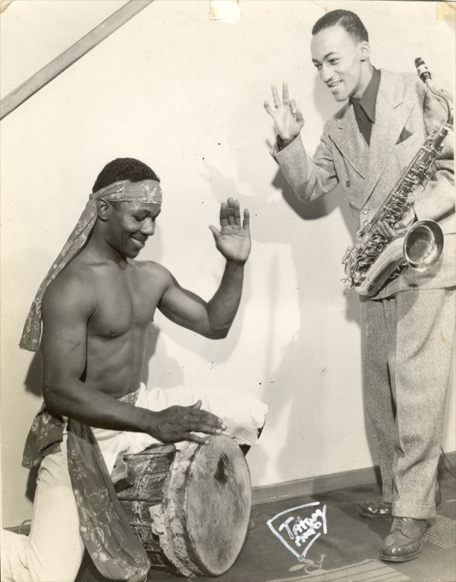
With the tremendous local publicity Fitzhugh had generated, McLin was having no trouble finding work elsewhere. On June 21, 1947, "Claude McLin and his 2 Kings and a Queen" [Walter Spratley, bass; James King, drums; and Wanda Chevonry, piano] were appearing at Ciro's Lounge (aka Ciro's Theatre Bar). This was located at 820 East 39th Street, not far from the Morocco Hotel and the Macomba Lounge (a 3 week contract with Ciro's was accepted and filed by Local 208 on June 19; a new contract for 6 more weeks was listed on July 17). On August 14, "the music of Claude McLin starring Gene Ammons" was advertised for the Jazz at the Pershing series on August 17: "Both McLin and Ammons are popular with patrons of the hall and there is every indication that the hall will be jammed." On August 23, the band was appearing at Ciro's (same ad as June 21; by now McLin's contract had been extended once again, accepted and filed by the Union on August 21). A large dance at the Park City Bowl on Sunday September 7 gave its billing to "Johnny Griffin His Sax and Orchestra... Plus Claude McLin and His Combo." On September 13th, another Ciro's Lounge ad appeared, as did another on October 4 (McLin was also scheduled for another dance at the Park City Bowl on October 5). On October 25, Claude McLin and his 2 Kings and a Queen were still at Ciro's (his contract for another six 6 weeks was accepted and filed by Local 208 on October 2). On November 2, 1947, Claude "McLinn" played another Sunday dance at the Pershing; the dances were now scheduled earlier in the day (3 to 8 pm) to draw a High School crowd.
During this period, Claude McLin became a frequent visitor at the Macomba Lounge where Tom Archia led the house band. Tom needed a replacement when he went out on the road with Hot Lips Page (November 1947 through early January 1948), but the Macomba could not have relied on Claude during the week, as he was still at Ciro's on November 22 and December 6 (he had posted an "indefinite" contract with Ciro's with the Union on November 20; on December 4 Local 208 posted a one-week contract with Ciro's with Wanda "Shevenry" as the leader, meaning perhaps that McLin was off the job for a week). At most, he worked the Macomba as a substitute for another saxophonist, or at jam sessions not detected and shut down by Harry Gray's assistants. Unfortunately, none of Claude's tenor "battles" with Tom Archia would be recorded...nor were his contests with Gene Ammons, Johnny Griffin, Von Freeman, and other local heroes.
On Saturday January 3, 1948, the New Savoy Ballroom welcomed Charlie "Yardbird" Parker and His Orchestra along with Claude McLin and His Combo. On Sunday it was just McLin's band. (McLin's 4-week contract was accepted and filed on January 8). Claude McLin's band settled in for a residency on January 11, on January 25 was paired with no less than Duke Ellington and his Orchestra. But the New Savoy would not keep its doors open long. When his 4 weeks were up, McLin moved over to George's Cocktail Lounge for 2 weeks (contract accepted and filed on February 5, 1948; another "indefinite" contract was listed on April 1). On February 19, McLin's new "indefinite" contract with his old home, Ciro's Lounge, was posted by Local 208. The Defender of March 6 advertised Claude at Ciro's (now with his "Kings and Queens"—possibly indicating an increment to the personnel budget?) Further ads for the engagement ran on March 27 and April 24, 1948.
The Defender was not publicizing the events at the Pershing Ballroom during the first half of 1948, but they kept going, and Al Benson broadcast some of them. Items from one of these jam sessions were recorded clandestinely by Benson (on that new-fangled medium, magnetic tape) and later sold to Aristocrat. Aristocrat released six sides under false names with misleading matrix numbers. Of these four include more than one tenor saxophone. Clearly Tom Archia is featured solist on one side, one is a battle between Archia and Gene Ammons, and two are solo features for Gene Ammons. However, a third tenor sax can be heard in the final chorus of "Hey Tom Archia," the Archia-Ammons battle, and this third saxophonist may be Claude McLin.
Gail Brockman (tp -2, 3); unidentified (tp -3); unidentified (tb -3); Andrew "Goon" Gardner or John "Flaps" Dungee (as -1, 2); Gene Ammons (ts); Tom Archia (ts); poss. Claude McLin (ts -1, 2); poss. Julian "Junior" Mance (p); poss. George Freeman (eg -1, 2); unidentified (b); prob. Ike Day (d).
Pershing Ballroom, Chicago, early 1948
| U7048S | Hey Tom Archia (no composer listed) -1 | Aristocrat 604A, Classics 5006 [CD] | |
| U-7139 | McKie's Jam for Boppers (Archia) -2 | Aristocrat 605, Classics 5006 [CD] | |
| U-7172 | Come Back to Sorrento^ (DeCurtis) -3 | Aristocrat 3301A, Classics 5006 [CD] | |
| U-7173 | Bronzeville Swing^ ("S. Van") -3 | Aristocrat 3301B, Classics 5006 [CD] |
We're talking obscurities here. It took 50 years for two of these sides to be recognized as Gene Ammons recordings; they were purposely misattributed to "Skeetz Van and His Orchestra" on release. A third includes a solo by Tom Archia, and was given a matrix number implying that it came from a studio session by Tom Archia's All Stars. A fourth was given a matrix number suggesting that it came from the Andrew Tibbs/Dave Young session. This, too, was recognized as including Gene Ammons—after it had been around for 52 years!
The late Charles Walton identified Gene Ammons as the only soloist on the "Skeetz" sides and Bob Porter concurs; two trumpets, a trombone, and another tenor sax can be heard at the end of "Sorrento," and riffing on "Bronzeville."
On "Hey Tom Archia," a guitarist is prominent (nearly in the front line, in fact), and there is a third tenor saxophone in the ensemble, though the tenor saxes are sometimes well off-mike when not soloing. "Hey Tom Archia" is a pure tenor battle on "I Got Rhythm" changes, and the immediate ancestor to "The Battle" and "Jam for Boppers" from Tom Archia's October 1948 session. The structure is as follows: vamp; Archia (1 chorus); Ammons (1 chorus); Archia (1 chorus); Ammons (1 chorus; someone shouts "Jughead!" during this one); Archia and riffs (1 chorus); Ammons and riffs (1 chorus). During the final chorus, three tenor saxes are clearly audible. It's worth noting that Aristocrat 604 was issued in August 1948, after these clandestine sessions had taken place. No composer is listed on "Hey Tom Archia" (a number based on "Flyin' Home"). The drummer appears to be no less than the legendary Ike Day (c. 1926-c.1954): compare the drumming on "Hey Tom Archia" or "McKie's Jam for Boppers" with "Stuffy" from Ike's only attested studio session, with Gene Ammons on February 28, 1949.
"McKie's Jam for Boppers" opens with a trumpet solo (which Campbell and Porter both suggest is Gail Brockman). Gail Brockman was billed as a "be-bop sensation" for a June 1946 appearance with the Dukes of Swing at the Club DeLisa. The trumpet solo is followed by an alto sax solo: Porter suggests Goon Gardner or Flaps Dungee, both Chicago altoists under the spell of Charlie Parker (Campbell leans more toward Gardner; Porter points out that Gene Ammons identified Dungee as the altoist on his Mercury recording, "Dues in the Blues."). The alto solo is followed by a piano solo (which Porter thinks may be Junior Mance), and finally a long solo by Tom Archia (Porter says the tenor is not Archia but both the tone and the licks are unmistakable). At least two tenor saxes can be heard riffing behind the trumpet solo. Porter also suggests that George Freeman could be the guitarist.
According to Charles Walton, the history behind the "Skeetz Van" sides is as follows. At some point during the first half of 1948, DJ Al Benson recorded at least one of the broadcast jam sessions from the Pershing Ballroom, at which Gene Ammons got prominent billing. The recording was strictly illegal because the Musicians Union's recording ban was still on. Moreover, Gene Ammons was under contract to Mercury through the end of 1949. So when Al Benson (cited on the "Bronzeville Swing" label in the phrase: "Dedicated to the 1949 Mayor of Bronzeville") purveyed the material to Aristocrat, devious measures were taken.
Two numbers with solos by Tom Archia were put out under Archia's name and given phony matrix numbers adjacent to the Andrew Tibbs session of September 1947 (U7148S) and Archia's October 1948 studio session (U7139). The two sides where Gene Ammons was the only soloist were attributed to Al Benson's go-fer, a streetwise non-musician named Skeets Van Orn. (Aristocrat 711, from the first studio session for the label led by Gene Ammons on February 28, 1949, was attributed to the "Three O'Clock Jam Session." The matrix numbers for that session, by the way, were U7174-U7181; the "Skeets" sides are U7172 and U7173) The matrix numbers for the four sides are out of sequence because they are entirely bogus.
Loud applause from a large audience can be heard at the end of both Skeetz sides. This may have been overdubbed, as Bob Porter points out was sometimes done on live recordings at the time.... No applause is heard on "McKie's," but the ambience is similar and the ending is cut off awkwardly, as if to excise applause. "Hey Tom Archia" also sounds like a live session. Interestingly, Porter hears a tape splice in the middle of "McKie's," which would be unusual for an early 1948 recording that was issued before the end of that year. Aristocrat's studio sessions were not yet being tape recorded in 1948; in fact, Universal Recording was using wire recording as a backup medium at the time.
Aristocrat 604, as we have noted, came out in August 1948. Aristocrat 605 was a 78-rpm single released in October 1948. Aristocrat 3301 appeared in February 1949. These items were reissued for the first time in February 2001 when Classics 5006 appeared, under the title Tom Archia 1947-1948.
Two more sides that we now believe came from this sam elive session at the Pershing are "Cabbage Head Part I" and "Cabbage Head Part II," (U7128A and B) released in August 1948 on Aristocrat 803. These are vocals by Jo Jo Adams, with accompaniment credited to Tom Archia and His All Stars. We haven't listed them here because the band is a quintet, and Tom Archia is the only saxophonist on either side.
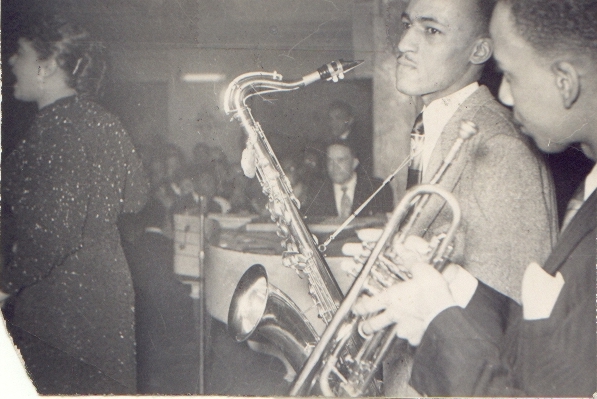
On May 30 an ambitious affair at the Carver High School Auditorium in the Altgeld Gardens was headlined by "a triple-header saxophone battle featuring 'Mr. Jam for Sam,' Tom Archia; 'The Crown Prince of the Tenor Sax,' Claude McLin and his band, and ex-Lionel Hampton sax star, 'Peanuts' Whalum." On July 2, 1948, Claude McLin was at El Casino with Chevonry, Spratley, and King (a rather dingily reproduced photo can be seen on the back of the Chess Vintage series LP, Chess CHV 414). Meanwhile, he was apparently replaced at Ciro's by pianist Andrew Jackson "Boogie Woogie" Allen, whose contract was accepted and filed by Local 208 on June 17. McLin resurfaced at the Quality Lounge around the end of July (his "indefinite" contract was posted on August 5).
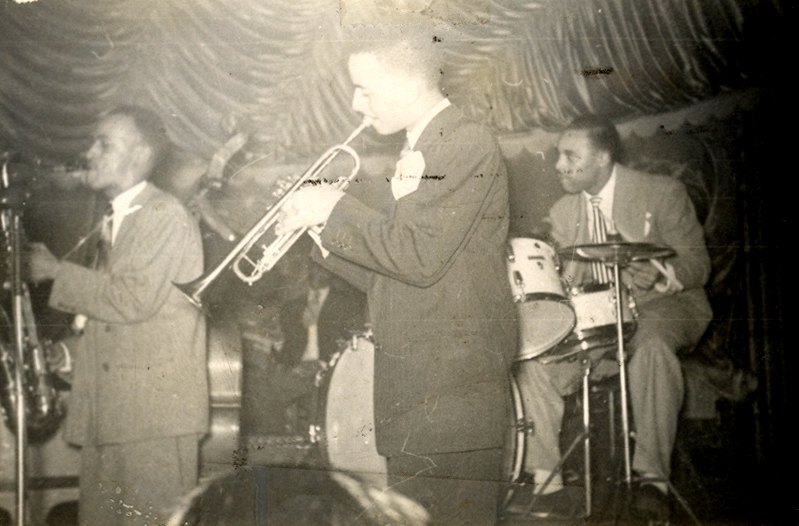
McLin lost his regular pianist in early September 1948, when Wanda Chevonry left to enroll in Maryland State College. Her replacement was William Strethen "Wild Bill" Davis, who had been working on and off in Chicago for some years.
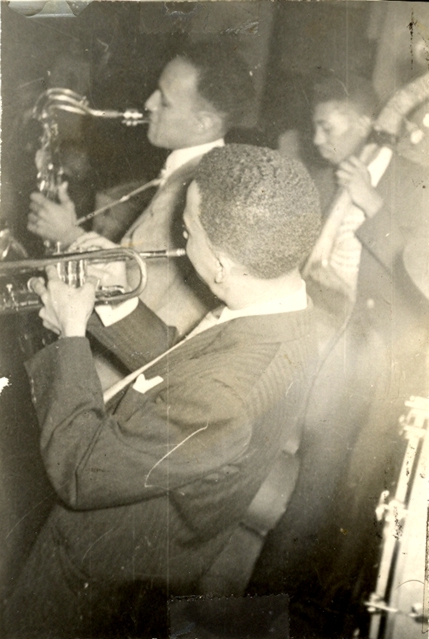
In September 1948, Claude McLin's combo worked the Que Lounge, closing on September 18 (we know because Musicians Union Local 208 would hit him up for delinquent "Local tax" on August 18, 1949).
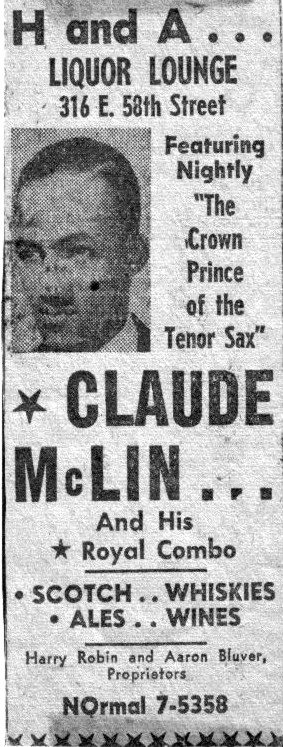
Notes in Otto Flückiger's files indicate that in October 1948, Claude McLin was working with "Wild" Bill Davis (piano) (the "real gone organist with Louis Jordan"), Walter Spratley (bass) and James King (drums). The October 20, 1948 Down Beat reports on Claude McLin playing recently with this lineup at the H&A Lounge on East 58th Street. Wild Bill Davis had been working in Chicago since October or November 1947, mostly as a leader, although he also appeared on Buster Bennett's last recording session in Decmber of that year. According to the Musicians Union Local 208 Board minutes (August 18, 1949), the H&A gig closed on October 25 (McLin's 4-week contract with the H & A was accepted and filed on October 7).
While one Freddie Holmes took over at the H&A, McLin probably went to Leo's Lounge for 2 weeks plus, with Wild Bill Davis as leader (both contracts accepted and filed by Local 208 on November 4). On November 7, McLin headlined at another Pershing Ballroom dance, along with Ivory Joe Hunter (Down Beat, "Chicago Band Briefs," November 3, 1948, p. 5). Down Beat on November 17 mentioned McLin working with Davis, Spratley, and King again, though now Aubrey (Bolinski) Coleman on trombone and Barbara Browning (probably a singer) were added.
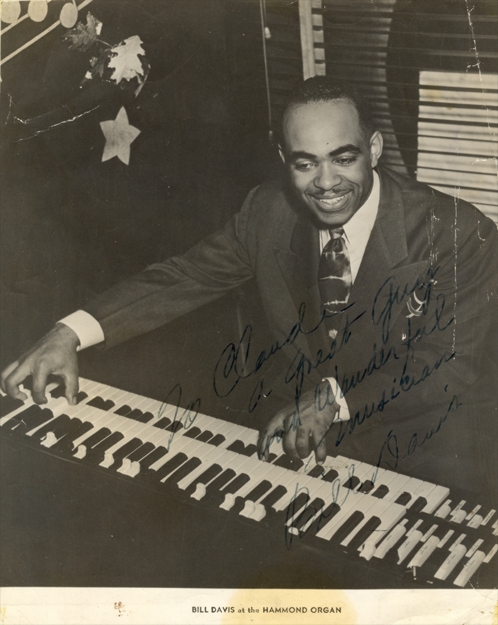
We are not sure what Claude McLin was doing after the end of the Leo's Lounge gig, or whether Wild Bill continued working with him. In any event, when McLin resurfaced at the Macomba Lounge in the spring of 1949, Davis was probably no longer in the band. Wild Bill Davis dropped off the Local 208 contract list until October 20, 1949, when he posted a contract for 2 weeks at Leo's Lounge again. Probably after this engagement, he took a long-term gig at Small's Paradise in Harlem (see the Wild Bill Davis interview in Cadence, September 1988, p. 23). Moving his base of operations to New York City, Davis would go on to great success as the leader of an organ trio.
After Tom Archia's last session for the Aristocrat label (early October 1948), Leonard Chess and Evelyn Aron seem to have turned their attention to Claude McLin. Meanwhile, Leonard and Phil Chess did not believe in spending their money on newspaper advertisements. Gene Ammons and Tom Archia traded places in February 1949; Ammons worked the Macomba and Archia went to the Congo Lounge, which had been Jug's usual hangout. Archia was back at the Macomba in early March, but then Claude McLin spelled him for two weeks. Because of McLin's chronic habit of falling into arrears on his Local tax (payable to Musicians Union Local 208), we know that he was working the Macomba during the week that ended on April 3, 1949 (see the Board minutes to December 15, 1949; he owed $20.42. McLin's 2-week contract was accepted and filed on April 7.)
From 1949 to 1951, McLin and Gene Ammons were Aristocrat and then Chess's top tenor saxophonists. Jug had a hit in 1950, with my "My Foolish Heart." Claude's version of "Mona Lisa" scored some local sales. His sales went rapidly down insstead of up after that, wherea Ammons' records continued to sell, as they do today.
Claude McLin's first recording as a leader was on a rare Aristocrat release that has been ignored since 1949. At the session his band backed Laura Rucker on two ballads and two blues. His band was readily available to Leonard Chess since they were playing the Macomba Lounge six nights a week at the time.
A piano player and singer, Laura Rucker was a long-time veteran of the Chicago club and recording scene. She may have been a native of Kansas City, since she worked with trumpeter Big Ed Lewis there in 1926. She first entered the recording studio in 1931 in the last days of Paramount, waxing four sides, including a duet with Georgia Tom Dorsey. Later sessions were with Vocalion (1935) and Decca (1936). In 1939 she also made an appearance on Bluebird as a vocalist with the Earl Hines band. Godrich, Dixon, and Rye's Blues and Gospel Records 1890-1943 (1997) characterizes her Paramount sides as blues and the later sides as jazz. In fact her 1935 version of "I'm Gonna Sit Right Down and Write Myself a Letter" went unreleased at the time, probably because she was emulating Fats Waller too fervently. One of her specialties during the mid-1930s, a perky number called "Something's Wrong"—"If there's too much tenor in his talk, something's wrong"—would not sit well with gay activists today.
Rucker was playing the 65 Club (65 East Garfield) in 1934, but from 1935 to 1940 she played regularly at Warren Larue's New Deal Tavern (located at Garfield and the "L"). The Defender gave her frequent exposure. The March 18, 1939 issue, for example, ran a photo (she was a rather regal looking lady) and reported on her engagement at LaRue's, saying she was known for her renditions of "I Can Get along Very Well without You" and "Deep Purple." Many of the items advertised her willingness to play and sing requests of the popular songs of the day. In 1940-41 she performed at the New Harlem Café (350 East 51st).
During the war years, Rucker often got work in Loop nighteries. On January 15, 1942, her contract with Tin Pan Alley was accepted and filed by Musicians Union Local 208. On February 5, her contract was posted with entrepreneur Sam Beer (we're not sure which club he operated). On July 2, 1942 she filed another "indefinite" contract with Tin Pan Alley. On September 16, 1943, her "indefinite" contract with the 2530 Club was accepted and filed. On October 21, 1943, her contract with Tin Pan Alley was posted by Local 208. On June 1, 1944, her contract with the Three Deuces (407 South Wabash) was accepted and filed. This Week in Chicago, an entertainment guide aimed at White audiences and focused on entertainment in the Loop, mentions Laura Rucker ("Decca's Sensational Recording Artist") in its December 9, 1944 issue; she was still resident at the Three Deuces. Peggy Lee said she used to go listen to Rucker sing with drummer Baby Dodds on Rush Street, claiming she got her style for Cole Porter's "Let's Do It" from Rucker. On January 3, 1946, she filed an indefinite contract with Tin Pan Alley under a married name, Laura Rucker Wills.
From 1946 through 1949 Rucker continued to work Chicago nighteries regularly. Not too long after her Aristocrat session she was playing the No. 10 at Madison and Crawford ("Chicago Band Briefs," Down Beat, July 1, 1949, p. 4).
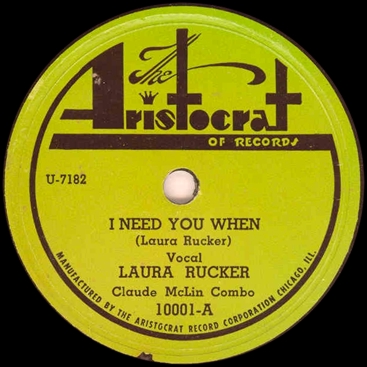
The other musicians on this session have never been credited in previous discographies, even though it appears that Claude McLin used his regular rhythm section (from his 2-week gig at the Macomba Lounge) and he is known to have added Rudy Mason's guitar from time to time. Tom Lord's section on Laura Rucker leaves this sesssion out entirely!
Laura Rucker (voc, p); Claude McLin (ts except -1); Rudy Mason (eg); Walter Spratley (b); James King (d).
Universal Recording, Chicago, March 22, 1949
| U-7182 | I Need You When (Rucker) -1 | Aristocrat 10001-A | |
| U-7183 | Again (Newman-Cochran) | Aristocrat 10001-B | |
| U7184 | Gulf Coast Blues | unissued | |
| U7185 | Cryin' the Blues | Chess CHD-4 9340, Chess MCA 380-596 |
Our initial session information came from Leadbitter, Fancourt, and Pelletier's Blues Records 1943-1970: L-Z (1994). LFP bail in the personnel department. They do not even recognize Claude McLin as the tenor sax player on the date!
Aristocrat 10001 was a single released in May 1949 (see the Aristocrat Discography). The matrix numbers in the shellac leave off the U prefix that can be seen on the labels.
The released titles were the two ballads, one of them Rucker's own composition. "Again" was considered a current song, so Aristocrat 10001 showed up in the song charts in Cash Box, along with all the better-selling ren\ditions. The blues (which the company may have considered too old-fashioned; "Gulf Coast Blues" had been a hit for Bessie Smith in 1923) were left in the can. Laura Rucker is in good form vocally on her own tune, "I Need You When," but the song is of indifferent quality, and Claude McLin does not play on it. "Again" is a better-written sentimental ballad on which McLin's sensitive accompaniment complements her singing. "Cryin' the Blues" is suavely sung and well played by the entire band, inlcuding Rucker herself.
"Cryin' the Blues" was first released on Chess CHD-4 9340, a 4-CD box titled Chess Blues, appeared in 1992; it was reused on Chess MCA 380-596, The Chess Story 1947-1975, a 15-CD extravaganza from 1999. We have yet to hear "Gulf Coast Blues"; the entire session is a prime candidate for reissue.
Wanda Chevonry enrolled at Maryland State College in the Fall of 1948, and the known lineups for October and November 1948 include Bill Davis on piano. Laura Rucker was used to backing herself on piano. Careful listening to the ballads and "Cryin' the Blues" indicates nothing in the piano part that a fluent blues and Swing player couldn't handle; indeed, the sound of "Cryin' the Blues" is consistent with what we hear on Laura Rucker's 1935 and 1936 recordings. We are assuming McLin's regular guitarist, bassist, and drummer.
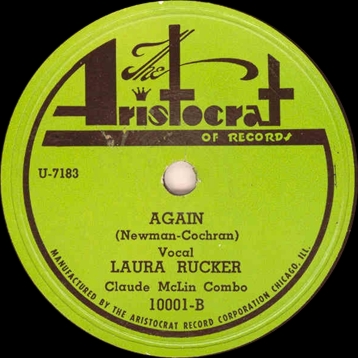
Although Leonard Chess would bring McLin back into the recording studios, he put his old reliable, Tom Archia, back in the club in April 1949 (with a couple of interruptions, Archia would remain until the Macomba closed in the fall of 1950). In May Claude McLin worked the Boulevard Lounge (his contract for 3 weeks, with option, was accepted and filed by Local 208 on May 19.)
On June 11, 1949, Claude McLin and His Combo were advertised at a venue in the same neighborhood as the Macomba, El Morocco Lounge in the Hotel Morocco (McLin's "indefinite" contract with El Morocco was accepted and filed on June 16; another inefinite contract followed on July 7). According to a quick mention in "Chicago Band Briefs" (Down Beat, July 1, 1949, p. 4), McLin's group had taken over from Robert "Little Sax" Crowder. On June 25, Claude McLin "Beautiful BeBop" was billed along with "Billye Williams, Keyboard Queen" at El Morocco (Byllye Williams, a lounge pianist and singer who enjoyed local popularity in Chicago, had recorded in 1947 for Opera and would would cut another single in 1950 for Theron). On July 4, a dance at the Rose Bowl sponsored by a veterans' organization had Dick Davis and his "noted combo," Clarence Anderson "and his all star band," and Claude McLin. Another Chicago Defender advertisement for El Morocco Lounge, July 23, 1949, touted the air conditioned club as follows: "It's Cool, It's Cool, It's Cool, 70 degrees, but Claude McLin is hot." On August 22, the "Claude McLin Bop Group" still held sway there. McLin worked El Morocco for 4 solid weeks, ending October 30, 1949 (again, we know about this because on November 3 Musicans Union Local 208 went after him for $48.64 in delinquent Local tax from the engagement). On November 18, 1949, Down Beat gave the Claude McLin Band lineup (they were still working the Morocco) as Clarence "Sleepy" Anderson (piano); Eugene Wright (bass); and James King (drums). The Morocco engagement appears to have ended on November 20 (McLin owed another week's worth of Local tax on it; see Local 208 Board minutes for December 15). After that the going got rough.
On December 15, 1949, McLin was called in front of the Local 208 Board "to show cause why action should not be taken against him for failure to clear" $56.14 in back Local tax.
The Board informed McLin that he had been called before them on a previous occasion pertaining to miscellaneous engagements and the Macomba tax. They further advised that they could not understand why his tax was continuously in arrears.
McLin explained that he had difficulties which he would not rather not discuss that caused him to be delinquent, and that for the present he was not working steadily enough to make a definite promise as to when the account would be paid.
On motion, the Board ruled that member Claude McLin shall stand erased until such a time as his entire indebtedness to the local has been paid, in full (Local 208 Board meeting minutes, pp. 3-4).
According to Down Beat in February 1950, the Claude McLin Band, now working the Platinum Lounge, included Eddie Baker (piano), Walter Spratley (bass), and James King (drums). Claude McLin's next opportunity to record was for the short-lived Parkway operation, on a session that was never released.
Bennie Green (tb); Claude McLin (ts); Willie Jones (p); Gene Wright (b); Dorell Anderson (d).
Chicago, April 10, 1950
| Pennies from Heaven | Parkway 1 | ||
| 3 unidentified titles | unissued? |
This enigmatic listing is drawn from Tom Lord's Jazz Discography. Lord got it from Walter Bruyninckx. Bruyninckx seems to have derived his, in turn, from Jørgen Jepsen, who identified the group as "Bennie Green's Band" but listed only "Pennies from Heaven." The three unidentified titles were mentioned in the Jazz Directory for February 1952, and incorporated into Bruyninckx' discography. Our thanks to Howard Rye for tracing this discographical entry back to 1952.
There was a contemporary announcement of the recording sesssion, a two-paragraph blurb in Down Beat for May 5, 1950. It ran on page 4 under the title "Record Distributor Waxes Benny Green":
Chicago—Record distributor Monroe Passis, whose Parkway label has heretofore been limited to such artists as Muddy Waters, Memphis Minnie, Sunnyland Slim, and so on, planned to record Benny [sic] Green's new band for its first pop release.
Among the four sides cut April 10 was Pennies from Heaven, tune most closely associated with former Ventura trombonist Green.
The alleged release number and the band personnel must have come from another source not yet traced.
In advertisements in the Chicago Defender,the drummer's first name was sometimes given as "Darnell." However, Vernel Fournier confirmed that his first name was "Dorell." Dorell Anderson was a leading jazz drummer on the local scene from the late 1940s through the mid 1960s; according to Alvin Fielder he was a victim of murder.
Was a Parkway 1 ever released? If so, does anyone possess such a rare artifact? And, if it did exist, it presumably had a B side. There was enough talent in the lineup to make you wonder what the music was like. Could tapes still be extant? Parkway had a relationship with the New Jersey-based Regal label. Monroe Passis' Chord Distributors was handling Regal from the label's inception in August 1949; many Parkway masters ended up with Fred Mendelsohn of Regal, and some (like those by Memphis Minnie) got their initial release on Regal; after closing Chord, Passis ran Record Distributors, Incorporated for National, Jubilee, Regal, and Atlantic, until Regal shut down in November 1951 and Passis was squeezed out of the music business. Mendelsohn preserved the Parkway masters in his possession, but the Bennie Green session was apparently not among them.
From February through June of 1950, Claude McLin was employed only sporadically. And he got into further trouble with the Union. Local 208 (rather incredibly for an organization that counted a large number of jazz musicians among its members) had a longstanding policy against jamming, which had been enforced against musicians at the Macomba Lounge in the past (on one occasion in 1947, Dexter Gordon was ordered to stop playing there by one of Gray's assistants). On April 11, around 12:30 AM, Tom Archia's regular band (Willie Jones, Lowell Pointer, and Robert "Hendu" Henderson) were joined at the Macomba by Claude McLin, tenor sax, and Forrest Sykes, piano. McLin and Sykes were fined $25 each, as was Archia for inviting them.
McLin stated that he knew he was violating the law, but felt that the ruling was unfair, because it did not give musicians a chance to exchange their ideas under a proper environment. He further stated that rehearsals might be the right place to work out ideas, but musicians get more out of their playing when they have an audience.
Tom Archia stated that he knew no jamming was permitted, but took a chance and got caught.
On March 19, 1950, McKie Fitzhugh was once again promoting Sunday afternoon dances at the Pershing Ballroom. The "Round-Up Ramble" featuring a band led by vibraphonist Cecil Bogan with "Claud" McLin and singer Leroy Shedd. Admission was a princely 75 cents.
On June 15, 1950, Claude McLin got a new contract with the Morocco Lounge for 6 nights a week accepted and filed; he also filed a contract for a recent 2-day gig at the El Bow Lounge. On the same date, however, he was hauled in front of the Local 208 Board for taking a one-night gig at the Bo-Dollar Tavern on June 1 for which he didn't file a contract until June 12. He was fined $25 on June 3 by Assistant William Dover and hit with a further demand for $13.34 in "local tax" at the Board meeting. He was told to pay up by June 20, or be suspended for 60 days and put on probation for 6 months. The Board had lost patience with Tom Archia; now it was after McLin.
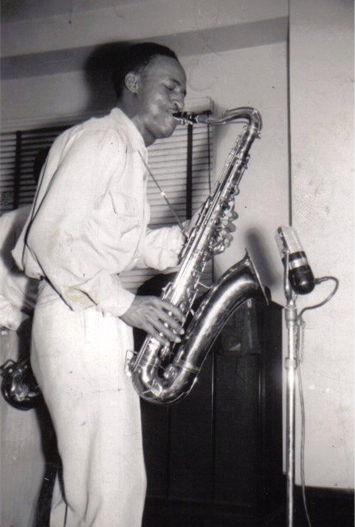
At least McLin got an an opportunity (again, courtesy of Leonard Chess) to go into the studio as a leader. Unfortunately, he didn't pay "Local tax" on the recording session either! Consequently we have learned the exact date of the session (we'd previously estimated May or June 1950) from the August 3 minutes of the Local 208 Board.

Claude McLin (ts); unidentified (ts -2); Eddie Baker (p); Rudy Mason (eg); unidentified (steel g -1); unidentified (vln -1); Walter Spratley (b); James King (d).
Universal Recording, Chicago, July 21, 1950
| U7257 | unidentified | unissued | |
| U7258 | unidentified | unissued | |
| U-7259 | Mona Lisa (Livingston-Evans) -1 | Chess 1432 | |
| U-7260 | Benny's Bounce (McLin) -2 | Chess 1432, Chess CHV 414 |
The back liners of Chess CHV 414, Chicago's Boss Tenors, an LP released in November 1971, assert that Wanda Chevonry was playing piano. This, regrettably, is not possible. Chevonry was attending Maryland State College in 1950; just before her planned return to Chicago, she was killed in an automobile accident on the last day of school, in early June. (Clifford Brown was badly injured in the same accident, which laid him up for nearly a year.) Published discographies list a guitar only on the next session, but the same guitarist is obviously on both. In suggesting a lineup of Wanda Chevonry, Rudy Mason (guitar), Walter Spratley (bass), and James King (drums), Chess CHV 414 assumed that Claude McLin was still using his 1948 lineup two years later. Apart from Chevonry's absence, this is actually plausible on the strength of McLin's personnel for February 1950.
The only known recording lineup for Claude McLin in 1950 has a very different rhythm section (see the Fall 1950 date with Charlie Parker). However, Chris Anderson, George Freeman, Leroy Jackson, and Bruz Freeman were Von Freeman's regular rhythm section at the Pershing Ballroom and would not have been recording with Claude McLin in the studio.
Claude's brother Ed McLin is incorrectly credited by Lord with playing trumpet on "Benny's Bounce." Ed worked in Claude's band on occasion in 1947 and 1948, possibly at other times. But no trumpet is audible on the track. A second tenor sax is present; it is duly credited by Lord as unidentified, and a second tenor saxophonist (unfortunately hidden behind Claude) is in the photo reproduced above.
The liners to Chess CHV 414 say of McLin that "his big record for Chess was a 78 of 'Mona Lisa,' replete with echo and augmented orchestra." We identified the augmentations by ear from a copy of the 78. Floyd Smith and Lefty Bates, two of the more frequently recorded musicians in Chicago during this period, both played steel guitar, but we don't know who might have been responsible for the augmentation job here. The steel guitarist doesn't solo.
Previous discographies have listed only U7259 and U7260 for this session, while leaving U7257 and U7258 unaccounted for. However, as Bob Porter points out, a 2-side session would not have been the norm; the Musicians Union insisted that its members be paid for 4 sides.

Leonard Chess smelled a hit. Chess 1432 was sped to release in August 1950 (it was mentioned in the Record Roundup section of Billboard on August 12, and reviewed in Cash Box on the same date, p. 16).
While things were looking up on one front, they were headed downward on another. On August 3, the Local 208 Board came down hard on McLin's failure to pay $44.64 in local tax on 4 weeks at the Morocco Lounge and $25.99 for the Chess recording session, along with $20 in fines.
Member Claude McLin failed to appear before the Board, as ordered, re: his delinquent tax account at the Morocco Lounge.
On motion, the Board ruled that since Claude McLin is a perpetual offender re: payment of local tax, he shall stand suspended for six months, during which time he cannot contract for engagements, nor play with or for members of Local 208. (Board minutes, p. 1)
Fortunately, McLin was able to appear on August 17 and plead with the Board not to suspend him.
McLin stated that he did not appear before the Board on August 3, 1950 because he had taken his family out of town, returning home around 10:00 A.M., and over-slept. He also explained that he had a system of holding tips until the end of each week, and that this amount was usually enough to pay the Local tax. Inasmuch as the tips did not always equal the tax, he had become delinquent....
McLin stated that he had been unemployed for approximately four months, playing occasional miscellaneous engagements, during which time he had gotten behind in his car notes and other items.
Claude McLin arranged to pay his arrears in installments; the Board responded by "rescind[ing] their ruling... as of August 3, 1950, and ruled that his suspension shall be held in abeyance for six months, pending his future deportment as a member of Local 208."
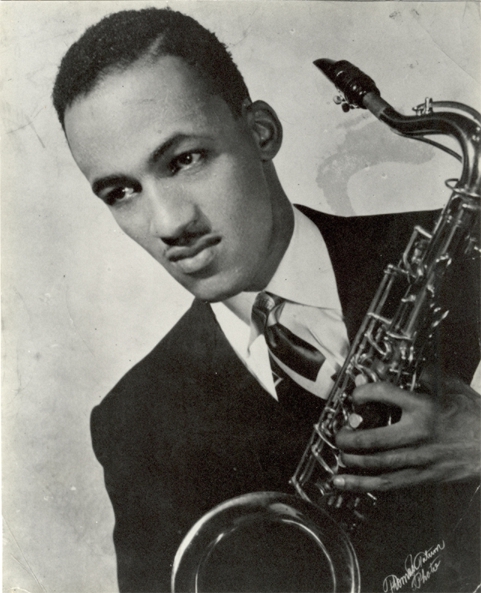
According to Down Beat on August 25, 1950, Claude McLin was back in his old haunts at the Morocco. And his new record was giving him a needed boost: the Wax & Needle column in the Defender (September 2) stated that "Mona Lisa" was one of the "Top three records as determined by an independent survey." By that time, Buddy's Chicken Shack was featuring McLin in a band led by Jimmy Scoggins, an old Army buddy. On September 16, Claude McLin was headlining at Joe's Rendezvous Lounge, "Playing His Latest Disc Hit, 'MONA LISA'." Harold Burrage and King Kolax were also on the bill. Down Beat had McLin still at Joe's Rendezvous on October 20.
We are not sure of Claude McLin's movements toward the end of 1950, because he was not filing contracts as a leader. (Meanwhile, the Pershing Ballroom negotiated yearly agreements with the Union that made individual contract filings unnecessary.) He was also keeping up with his Local tax for those six months, thus heading off the threatened suspension and further appearances in front of the Local 208 Board. He seems to have spent part of this period at the Pershing Lounge, however.
Charlie Parker (as); Claude McLin (ts); George Freeman (eg); Chris Anderson (p); LeRoy Jackson (b); Eldridge "Bruz" Freeman (d).
Pershing Hotel Ballroom, Chicago, October 23, 1950
| There's a Small Hotel* | Savoy MG12152, Realm [Br] RM214, Realm [Br] 55214, BYG [F] 529.135, Monkey [F] 40011/2, CBS/Sony [J] SOPU-26, CBS/Sony [J] SOPL-69, Savoy SJL 1132, Savoy SJLCD-2DS-4423, Savoy [J] SV-954 [CD], JUTB [It] CD3008 | ||
| These Foolish Things | Savoy MG12152, Realm [Br] RM214, Realm [Br] 55214, BYG [F] 529.135, Monkey [F] 40011/2, Monkey [F] MY40033, CBS/Sony [J] SOPU-26, CBS/Sony [J] SOPL-69, Savoy SJL 1132, Savoy SJLCD-2DS-4423, Savoy [J] SV-954 [CD], JUTB [It] CD3008 | ||
| Keen and Peachy | Savoy MG12152, Realm [Br] RM214, Realm [Br] 55214, BYG [F] 529.135, Monkey [F] 40011/2, CBS/Sony [J] SOPU-26, CBS/Sony [J] SOPL-69, CBS Sony [J] SOPJ134-5SY, Savoy SJL 1132, Savoy SJLCD-2DS-4423, Savoy [J] SV-954 [CD], JUTB [It] CD3008 | ||
| Hot House* (Dameron) | Savoy MG12152, Realm [Br] RM214, Realm [Br] 55214, BYG [F] 529.135, Monkey [F] 40011/2, CBS/Sony [J] SOPU-26, CBS/Sony [J] SOPL-69, Savoy SJL 1132, Savoy SJLCD-2DS-4423, Savoy [J] SV-954 [CD], JUTB [It] CD3008 | ||
| Bird, Bass and Out [Swivel Hips] (McLin) | Savoy SJL 1132, Savoy SJLCD-2DS-4423, JUTB [It] CD3008 | ||
| Goodbye (Gordon Jenkins) | Savoy SJL 1132, Savoy SJLCD-2DS-4423, JUTB [It] CD3008 |
Our basic information about this set from Peter Niklas Wilson and Ulfert Goeman's book Charlie Parker--Sein Leben, Seine Musik, Seine Schallplatten. Savoy MG12152 is an LP called An Evening at Home with the Bird. It was later rereleased as Savoy WL 70545 and Savoy SJL 1132 (new title One Night in Chicago) with "Bird, Bass and Out" and "Goodbye" added. A 1990s CD on Denon/Savoy Jazz SV 0154 seems to revert to the old title and the four-tune lineup. Other releases (we may not have caught all of them) were added added from Lord, who has the entire set on Denon/Savoy Jazz SV 0154. The entire set is also on the 4 CD box Charlie Parker: The Complete Live Performances on Savoy, which was released in 1998.
According to Wilson and Goeman, only "There's a Small Hotel" is complete, though "Hot House" as well as "Goodbye" are nearly so. Nonetheless, there much McLin to be heard. On the original Savoy issue (and every other issue before SJL 1132, so far as we know) the tenor solo on "Small Hotel" as well as the alto solo on "These Foolish Things" were artifically repeated. SJL 1132 restores the original recording. It is not known whether the Denon/Savoy CD reverts to the doctored versions. The Savoy CD release from 1998, which we have heard, avoids doctoring.
These sides (which, because of the Bird connection, have been released far more often than the rest of Claude's recordings put together) have led to much confusion. Many sources identify the tenorist as Von Freeman, and it is his band—but the fact that "Bird, Bass, and Out" is really the Claude McLin composition "Swivel Hips" tends to rule him out! (Kudos to Bob Porter for recognizing "Swivel Hips"; Claude McLin's own recording of it has appeared just once, on an obscure reissue LP. Claude McLin confirmed his presence on these sides in a 1978 conversation with Porter.) Besides, the tenor solos are definitely by Claude and not Von. There is other Pershing Hotel material from the same date, but it seems to involve a different band with Von Freeman on tenor sax. However, Loren Schoenberg's notes to the Savoy 4-CD set indicate that the recordist for this audience tape gave October 23, 1950 as the date. Judging from an announcement at the end, the material is from the final set of the night.
On November 23, a McKie-sponsored Thanksgiving Night dance at the Pershing Ballroom featured four different bands and included Eddie Chamblee, Tom Archia, Claude McLin, John Jenkins, Cecil Bogan, and Bruz Freeman. On this occasion, it was Eddie Chamblee's photo that ran in the Defender (November 18).

Claude McLin (ts); unidentified (vln); Norman Simmons (p); unidentified (eg); unidentified (b); unidentified (d).
Modern Recording Studio, Chicago, prob. November 1950
| AR-30451 E0-0B-13025-1 |
Tennessee Waltz (Stewart-King) | Chess 1446 | |
| AR-30452 E0-0B-13026-1 |
Pop Goes the Weasel ("McLin") | Chess 1446 |
Tom Lord's Jazz Discography lists this session and gives the date as c. 1952. That's way too late for a release on Chess 1446, which took place in December 1950.
The matrix numbers indicate that the sides came from a studio that Chess didn't normally use; the abbreviation M. R. S. is scratched in the vinyl on both sides. In 1950 a fully equipped outfit called Modern Recording Studio was in operation at 55 West Wacker Drive in Chicago. The proprietor was Edwin M. Webb; he'd opened the studio in 1947. The Chess brothers did not establish a regular connection with MRS (this is the only session that they conducted there), but their occasional joint venture partner JOB would employ it regularly until 1953, and other labels of varying size, such as Rondo and Theron, also used it.
Some copies of Chess 1446 also carry the E0 series numbers in the trailoff vinyl. These indicate mastering and pressing by RCA Victor.
The immediate occasion for this session was Patti Page's hit recording of "Tennessee Waltz," which someone with an entrepreneurial mind thought might turn into another "Mona Lisa" for Claude. This presumably also led to the decision to include a violinist on the ballad. Unfortunately, Chance had the same idea for John "Schoolboy" Porter, and his instrumental version of "Tennessee Waltz" (despite the rather square vocal performance of the tune on the flip side) was the local hit, not Claude's. We estimate the recording date as November based on two considerations: (1) the Schoolboy Porter version was cut in September or October and released in November 1950; and (2) three recording sessions for the Seymour label, whose commercial launch was announced in September 1950, were cut at Modern Recording Studio; the matrix numbers on these items were in the 27550s and 27660s.
Existing discographies give no personnel for this date. But in an interview with Alwyn and Laurie Lewis for Cadence, pianist Norman Simmons (born in Chicago on October 6, 1929) remembers: "I was in Claude's band and the record company had us make 'Tennessee Waltz,' things like that, trying to make a hit out of them."
Claude McLin turns in an effective jazz ballad performance on "Tennessee Waltz" and the violinist gets in a decent solo as well. The studio reverb is heavy, but the overall effect is less syrupy than on "Mona Lisa." (By contrast the Schoolboy Porter version is well-played, but Schoolboy sticks to the melody.) "Pop Goes the Weasel" works surprisingly well as an uptempo blowing vehicle, with quotations from other tunes worked in; McLin and Simmons are both shown off to advantage.

On Christmas night, 1950, another Fitzhugh-sponsored dance at the Packinghouse Workers Hall starred Oscar Pettiford and his band. Claude "McLinn," Eddie Chamblee, and Grady Johnson were also on hand, along with several vocalists. To top it all, the Defender did a two-week buildup for a New Year's Eve benefit dance at the Giles Armory (to benefit the South Side Boys Club). This dance featured Lester Young, Claude McLin, and Jo Jones, along with Dr. Jo Jo Adams.
After the 6 months' probation were up, McLin soon found himself in trouble with the Union again. On April 19, 1951, the Local 208 Board dryly noted on page 3 of its minutes that McLin owed $21.20 in back tax and $20 in fines. He owed for a couple of Sundays at the Pershing Lounge (ending February 11), two one-nighters at the Masonic Hall (February 17 and March 10), an appearance at the Opera House (March 25), and a week in his old haunts at the Morocco Lounge, ending April 1.
We do not know for sure whether Norman Simmons was still in McLin's band for the last Chess session, but this seems likely. (Eutrace U. "Prince" Shell told Allan Chase that he played piano in Claude McLin's combo, but we don't know exactly when.) In his Cadence interview, Simmons recalls that McLin "played like Lester so Billie Holiday always had him back her." (Because Billie during this period toured with her own pianist and didn't keep written arrangements handy, Simmons didn't accompany her on her appearances in Chicago).
Simmons also remembered that "Claude's was one of the first bands I wrote for and we had some good jobs and when I first heard Sarah Vaughan I was working at the Blue Note with Claude, opposite her." Vaughan was a frequent visitor to the Blue Note, with 13 appearances through the end of 1952. She was there in June 1950 and her appearances in 1951 took place in January and July, but the notices that mention a band don't mention Claude McLin. The notice we've seen for January 1951 doesn't mention the band (Chicago Tribune, January 21, 1951, pt. 7 p. 12), so we're thinking this was the one. According to the Board minutes of Local 208, on July 19, 1951, McLin was being hit for $46.90 in delinquent Local tax and $20 in fines "for engagements played at the Hi Note, Blue Note, and the Pershing Ballroom." This time McLin was ordered to cough up "within ten days, or he shall stand erased" (p. 3). McLin's 2-week contract for the Hi-Note (an interesting venue, widely thought to be owned by singer Anita O'Day) had been posted with Local 208 on June 7. On July 4, his band was advertised as backing Mary Ann McCall, who was at the club for a week (Southtown Economist, July 4, 1951, p. 10).
At least Leonard Chess kept up his interest, bringing McLin's combo back into the studio for a final session.
Claude McLin (ts); prob. Norman Simmons (p); Rudy Mason (eg); Walter Spratley (b); James King (d).
Univeral Recording, Chicago, August 7, 1951
| U7367 | Swivel Hips (McLin) | Chess CHV 414 | |
| U7368 | Green Dolphin | Chess (unissued) | |
| U7369 | Vanity | unissued | |
| U7370 | Never Mind (McLin) | Chess CHV 414 |
Our information is from the back liners of Chess CHV 414, Chicago's Boss Tenors, an album released in November 1971. The pianist cannot be Wanda Chevonry, for the reasons given above. The rhythm section sounds like the one that McLin used on the "Benny's Bounce" session. The date is usually given as April 7, 1951 (this appears on Chess CHV 414 and in Ruppli's Chess discography), but in the U7000 matrix series the outing comes after the July 11 session by Muddy Waters and Jimmy Rogers.
Despite the obvious quality of the two that have surfaced on LP, none of the titles appeared on 78 or 45. (And the rest of the session, if it is still extant, ought to be issued.)
Apparently the Chess brothers gave up on Claude McLin. They may have been discouraged by poor sales on his "Tennessee Waltz" coupling, or they may have held off for a few months and then decided not to proceed after he left town for Los Angeles and was no longer available to plug a new record at personal appearances.
The Fitzhugh-sponsored sax battle shows continued through 1951, though without the display ads and other heavy promotion of years past. The only mention of a McLin engagement in 1951 is an item mentioning an appearance by Lester Young at the Pershing Ballroom on September 2. "Claude McLinn [sic] and his fine orchestra will share the spotlight with Lester and of course Claude is bringing his own sax ace, Grady Johnson which means Lester must step to hold the spotlight he has been cast in." During the last quarter of 1951 McLin worked the Morocco Lounge and Club Bagdad; his contract for two weeks plus an option at the Bagdad was filed on October 18. (On November 20, 1951, Local 208 threatened him with erasure if he did not pay $25.34 in back Local tax from these engagements, plus another $20 in fines).
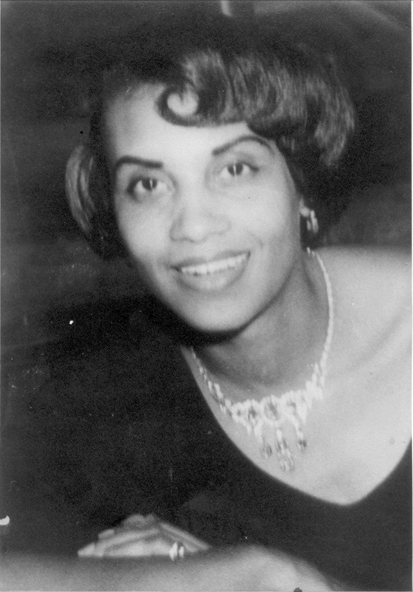
At a date we still have to track down, Claude McLin married Jacquelyn Gail Fuller. Also a native of Chicago, Jacquelyn was born on October 1, 1921 (the fact that she was older than Claude was for many years a closely guarded secret). Jacquelyn had also served in the Army; she was in the first groups of WACs to be sent to Europe.
The McLins departed Chicago for Los Angeles early in 1952. (There are no contracts under Claude's name on the Local 208 list from that year; so far as we know, he never worked in Chicago again.) According to his son Greg (telephone interview, May 12, 2003), while Jacquelyn was expecting their first child, they packed up their car and drove across country to Los Angeles. Claude McLin III, usually known as "Jay," was born in Los Angeles on August 16, 1952.
For the next 12 years, Claude McLin was able to find steady musical employment in LA, with occasional excursions to San Francisco and Las Vegas. Jacquelyn appeared as an extra in a crowd scene in the 1954 movie Carmen Jones; later she would operate clothing stores.
Club gigs could be had in the new environment; recording opportunities proved much harder to come by. The first one that we have uncovered is a 1954 session behind Amos Milburn. The arrangements are strong (featuring great baritone sax work from Jewell Grant) and the material classic. The tenor soloist on each of the four tracks is a pronounced honker. We used to think that this was all Clifford Solomon's doing, since his other records are in that style. But as we have become acquainted with the Dootone and Allegro sides, we've realized that Claude McLin adapted to changing tastes by adding the honk to his repertoire (as can be heard on "You're Lookin' Good" from 1958 and "The Growler" from 1962). Tenor solo credits to be sorted out!
Amos Milburn (voc); with Jesse Stone (dir, arr, poss. p); Harry Parr Jones (tp); Clifford Solomon (ts); Claude McLin (ts); Jewell Grant (bars); prob. Isaac Royal (p); Jack Marshall (eg); Red Callender (b); Oscar Lee Bradley (d).
Radio Recorders, Los Angeles, June 23, 1954
| RR2287-8 | One, Two, Three, Everybody | Aladdin 3269, Aladdin [J] TOCP-7287, Route 66 [Swe] KIX7, Mosaic MR10-155, Mosaic MD7-155 [CD] | |
| RR2288-10 | That's It | Aladdin 3269, Mosaic MR10-155, Mosaic MD7-155 [CD] | |
| RR-2289 X; AL3253X (RR2289-4) | Vicious, Vicious Vodka (Joseph C. Smith) | Aladdin 3253, Aladdin E2-27229, Mosaic MR10-155, Mosaic MD7-155 [CD] | |
| RR-2290 Q; AL3253Q (RR2290-7) | I Done Done It (R. E. Toombs - C. E. Calhoun - A. Milburn) | Aladdin 3253, Aladdin E2-27229, Route 66 [Swe] KIX6, Mosaic MR10-155, Mosaic MD7-155 [CD] |
Aladdin 3253 and 3269 were 78- and 45-rpm singles released at the time. Route 66 KIX6 was a Swedish Amos Milburn LP titled Rock, Rock, Rock; Route 66 KIX7 was a Swedish Amos Milburn LP titled Just One More Drink. Mosaic MD7-155 is a 7-CD boxed set released in 1994 under the title The Complete Aladdin Amos Milburn; as was Mosaic's practice at the time, the same set also appeared on 10 LPs as MR10-155. Most discographical details are from the Mosaic booklet, which is the best source on Milburn's Aladdin recordings. The band name and the matrix numbers used on Aladdin 3253 (matrix number an alphabetical suffix and no take number on the label; AL plus release number and the alphabetical suffix incised in the vinyl) are from a copy in Armin Büttner's collection.
Gregory Stewart McLin was born on January 18, 1956; the McLins' only daughter, Marissa Diane, followed on March 3, 1958.
Although Claude McLin never became a regular on the West Coast R&B recording circuit, he could have participated in additional sessions that we do not currently know of. We have learned of 10 singles that he made in Los Angeles, plus two tracks that eventually saw the light on an LP: all were under his own leadership.
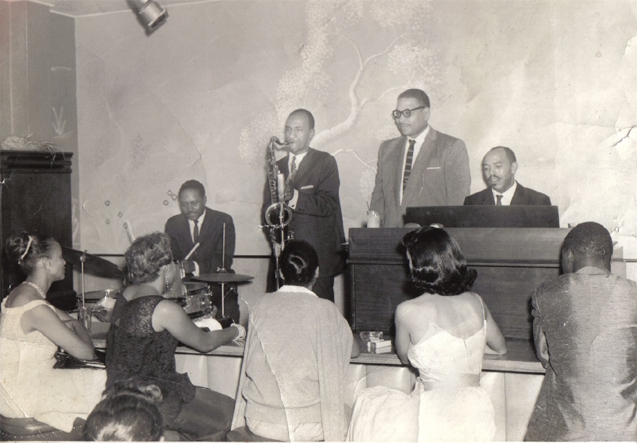
According to Greg McLin, Claude worked with a trio or a larger combo, depending on the gig. Around 1956, Los Angeles was caught up in the nationwide vogue for organ trios; after that he worked regularly with such an ensemble. A frequent collaborator during this period was drummer Bruz Freeman (visible in the fall 1948 photo from the Pershing Ballroom). who had also moved from Chicago to LA. (Eventually Bruz would become a tennis pro, though he continued to play and record jazz when the opportunity arose.)
The drummer on his next session, however, was another regular on the LA scene, Oscar Lee Bradley. According to the California Eagle's People and Places column, "OSCAR BRADLEY – A shade behind Buddy Rich as a drummer is currently giving the skins a musical workout nightly at the Club Intime with the Claude McLin Group" (January 16, 1958). The group was featured at Club Intime (50th and Western) for at least three months; the Eagle ran advertisements for it on February 20, March 6, March 20, March 27, April 17, and April 24, 1958.
During its stay at Club Intime, the trio cut four sides for Golden Tone.
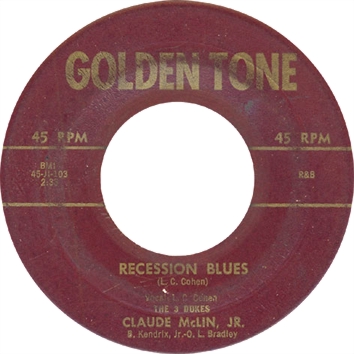
L. C. Cohen (voc on *) accompanied by The 3 Dukes: Claude McLin, Jr. (ts); Berkeley Kendrix (org, p); Oscar Lee Bradley (d)
Los Angeles, prob. February or March 1958
| 45-JI-103 | Recession Blues (L. C. Cohen)* | Golden Tone 103 | |
| 45-JI-104 | Care for You Baby (L. C. Cohen)* | Golden Tone 104 | |
| 45-JI-105 | That's Cool Man (Nuesca) | Golden Tone 105 | |
| 45-JI-106 | Slow Drag (McLin) | Golden Tone 106 |
The first Golden Tone single (103/104) eluded McLin specialists for many years. A copy of Claude's first West coast jukebox effort showed up in an auction on ebay in March 2004, and a second one came along in July. The personnel comes from the label of this second copy. Golden Tone 103/104 was a 7-inch 45 rpm. The copies that we have seen have somewhat worn labels in dull gold print on a faded dark red background. Though the print is legible, it reproduces poorly when scanned.
Totally unsuspected—until it turned up on ebay when a DJ's collection was being auctioned off in November 2004—was the second (!) Golden Tone single, 105/106, consisting of two instrumentals by the trio.
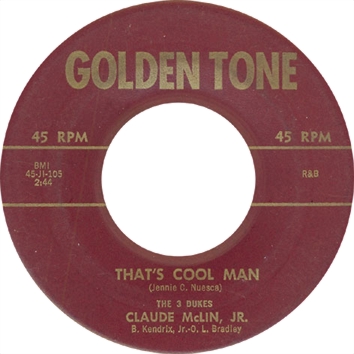
No instruments are listed on the labels, but it's obvious that "O. L. Bradley" is Oscar Lee Bradley, who played drums on the June 1954 Amos Milburn session.
The organist, "B. Kendrix Jr.," has been identified by Bob Porter as Bert Kendrix. (To be strictly accurate, on one side of 105/106 Kendrix is playing piano while working the organ pedals with his feet.) Berkeley "Bert" Kendrix was orignally from Arkansas and had earned a law degree. In 1963, he would be a member of the HIdeaway All-Stars, with Plas Johnson, Clifford Scott, and Robbie Robinson, saxes and flute, and Wayne Robinson, drums. Bert Kendrix and Wayne Robinson backed Clifford Scott on two sessions in March of that year for World Pacific; these were released on the LP Clifford Scott Plays the Big Ones. In August 1963, Scott, Kendrix, and Robinson backed Jimmy Witherspoon on his Evenin' Blues LP for Prestige. (According to Bob Porter, the Witherspoon LP was recorded in Los Angeles.)
Besides the matrix numbers, both sides of each Golden Tone carry the delta numbers used at the Monarch pressing plant in Los Angeles. Delta numbers 22130 and 22131, on 103 and 104, give us a pressing date of March or April 1958. McLin solos on both medium fast blues numbers, accompanied just by organ and drums.
On 105 and 106, the delta numbers are 22269 and 22268, respectively, indicating that the record was pressed in May or June 1958.
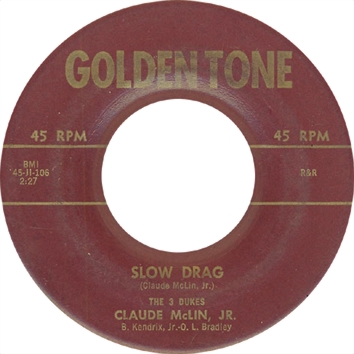
L. C. Cohen, who sings on Golden Tone 103/104 in a soul blues style, was one of the leads in a 1950s L.A. gospel group, The Zion Travelers. With the Travelers, he produced a lengthy discography extending well into the 1960s; this was one of his few secular ventures.
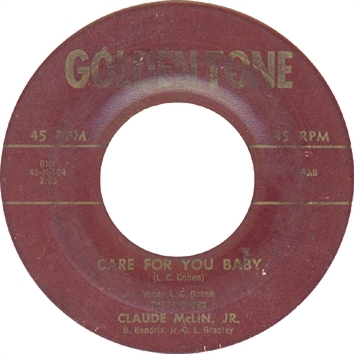
That same year, Claude McLin next got a chance to record as a leader for Dootsie Williams' Dootone operation, but the sides were held from release for a while. He was accompanied by a full trio of organ/guitar/drums, presumably one of his working groups.
Claude McLin (ts); unidentified (org); unidentified (eg); unidentified (d).
Los Angeles, 1958
| So Fine (McLin) | Dootone LP 863, Ace CDCHD 839 | ||
| You're Lookin' Good (McLin) | Dootone LP 863, Ace CDCHD 839 |
It has been said that these two tracks were first released on Dootone LP 863, at an unknown date. Of course, if there was such an LP it was obviously a various-artists compilation, as no other Claude McLin tracks have been traced to it. Further details would be helpful. "So Fine" and "You're Lookin' Good" were reissued in 2002 on Ace CDCHD 839, Dootone Rock 'n' Rhythm & Blues. Our thanks to Dave Penny, who alerted us to this previously unlisted session; Bob Porter had previously mentioned two unreleased blues instrumentals by Claude McLin in the Dootone vaults. "So Fine" features soloists by the guitarist and the organist; "You're Looking Good" is a solo vehicle for the leader, who is presumably also responsible for the shouted title at the beginning and the end of the piece. By this point, Claude McLin had developed the heavier sound on his tenor, with a distinct growl that can be heard on both of these sides.
CLAUDE MC LIN – Crown Prince of the Tenor Sax, originally from “Windy City” brings his swinging trio to Dynamite Jackson’sFamous Cocktail Lounge at 4456 W. Adams Blvd, starting Sept. 1st. for a lengthy engagement. Accompanying the Prince will be the master of skins, Oscar Bradley on drums, and sensational Burkley Kindricks [sic] at the Hammond organ.
After three months, Bert Kendrix went out on his own, taking a gig at Marty's Cocktail Lounge, 58th and Broadway (Kendrix became a regular there; his trio was in residence in February 1961). With another organist or organists, the McLin trio continued at Dynamite Jackson's for another 7 months; on June 11, 1959, the Eagle announced that they were being replaced by a group led by organist Paul Bryant.
In 1959, Claude's mother Isabella moved to Los Angeles (she was mentioned in the California Eagle's society column on May 28). In 1961 she was followed by Ed McLin, who had remained musically active in Chicago (though apparently not as a leader). According to Greg McLin, Ed shut down his musical career not long after arriving in LA and went into real estate.
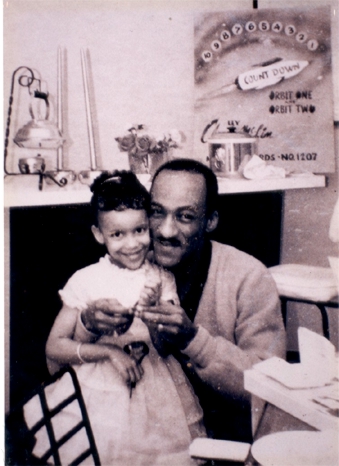
Claude and Jacquelyn opened the Countdown Café probably in 1960. Located at 4321 Crenshaw in Los Angeles—the address inspired the name—the restaurant remained in business for about two years. According to Greg McLin, the next single—released on the McLins' own label—got its title from the newly opened restaurant.

Claude McLin (ts, announcement); unidentified (org); unidentified (eg); unidentified (b); unidentified (d).
Los Angeles, prob. 1960
| Count Down Orbit One (McLin) | Mac-Jac MJR-1207 | ||
| Count Down Orbit Two (McLin) | Mac-Jac MJR-1207 |
We first heard about this 45-rpm single from Bob Porter (it is not mentioned in any previous discographies). The music is a fast blues, credited to Claude J. McLin, Jr. (McLin Music, BMI). The label's address is given as 4417 West Adams Blvd., Los Angeles 16, California (near the intersection with Crenshaw). What the primary business was at that address we do not know, but in the early 1980s a club called Bard's Apollo was located there (email communication from Mike Martzke, January 6, 2006).
Side one (which runs 2:02) begins with Claude McLin reciting the countdown, then features guitar and organ solos; side two (timing out at 2:50) features his tenor sax all the way.

From May 5 through July 21, 1960, the California Eagle ran regular ads for the Golden Mirror, a lounge located at 3054 West Pico. Claude McLin presided over jam sessions on Wednesday nights.
After his promotional 45 on Mac-Jac, Claude McLin established a relationship with a label called Allegro, where he was responsible for six known singles.
Allegro was a small company in Los Angeles, with 12 known single releases, plus one LP. Thanks to the research of Armin Büttner and Opal Louis Nations, we know that it was in business from late 1960 to roughly 1965. The company was owned by Dunlap J. Cawthron (1914 - 2004). Cawthron's place of birth is not known, but his Social Security number was issued in Illinois. His day job, inspecting meat for the United States Department of Agriculture, entailed a lot of travel. His first venture into the record business was the Cawthron label, run out of St. Louis; there are five known relaseses on Cawthron, all from 1959. The Cawthron label recorded R and B and gospel artists, and relied on custom pressings from Rite Records Productions of Cincinnati, Ohio, which catered to small record companies.
By the middle of 1960, Cawthron had moved his company to a Los Angeles address, and by November of that year he had changed its name to Allegro. It looks as though he changed the imprint first to C&C; all C&C's carry the Los Angeles address, but the earliest one, C&C 509 by R and B singer Herman McFadden, is in the same release number series as the Cawthrons.
Allero also recorded R&B guitarist and singer Curtis Jack Griffin, identified on the labels as "C. C. Griffin." Cawthron liked colored vinyl and came up with some striking color combinations. The Griffin 45, on Allegro 2001, is so resplendent that we can't resist showing it here.
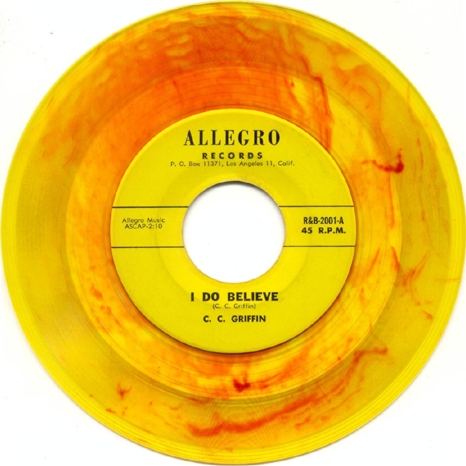
Apart from McLin, McFadden, and Griffin, Allegro artists were gospel performers: Zena Ayo, Vermya Phillips, Kathryn Adams, and The Perry Trio. One of the label's last productions was in entire LP by Vermya Phillips.
Cawthron's little outfit was not connected with another Allegro label that turned out a bunch of cheap LPs in the early 1960s.
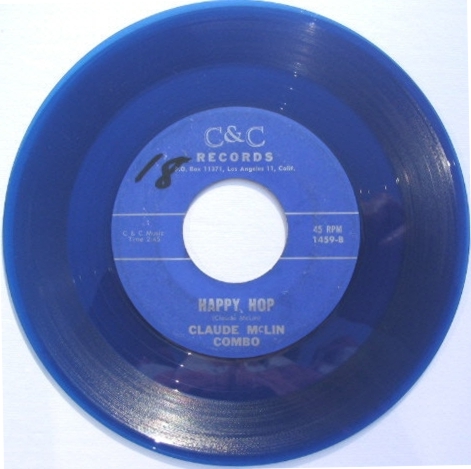
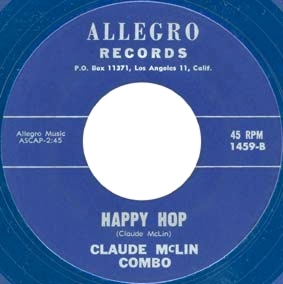
None of the Allegros are listed in previous jazz discographies, and when we began our Claude McLin page, we had no idea of any of them. Dieter Hartmann informed us about a copy of Allegro 1462 in his collection; the other McLin Allegros were tracked down by Armin Büttner after they surfaced on ebay.
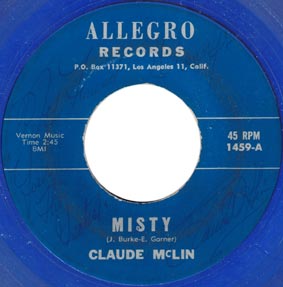
Claude McLin (ts -2, voc -1); unidentified (org); unidentified (eg); unidentified (b); unidentified (d).
Allego Recording and Music Studio, Los Angeles, late 1960
| 1459-A | Misty -1 (Burke-Garner) | Allegro 1459-A | |
| 45-1460-A (in vinyl), 1460-B (on label) | Satin Doll -2^ (Ellington) | Allegro 1460-B | |
| 45-1460-B (in vinyl), 1460-A (on label) | Swinging Bag Pipes -2^ (McLin) | Allegro 1460-A, C&C 1460-A | |
| 1459-B | Happy Hop -2^ (McLin) | Allegro 1459-B, C&C 1459-B |
Here we get into the confusing ways of some small record companies. Allegro issued both a 1459-A/1460-B, and a 1459-B/1460-A. Four different sides, of course!
Meanwhile, Billboard was sent a pressing of what we might have expected: 1460-A/1460-B. The December 5, 1960 issue gave "Swinging Bag Pipers" and "Happy Hop" three stars each.
Allegro 1460-A/1459-B was pressed on blue vinyl; it was also issued (again on blue vinyl) on the C&C label, with the same business address as Allegro.
Also pressed on blue vinyl, Allegro 1459-B/1460-A does not carry a CP number the way 1462 does. 1459-A also has R1-S-A in the trailoff vinyl.
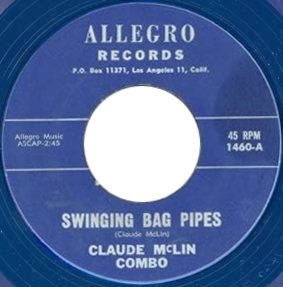
"Misty" features a rather schmaltzy vocal by Claude McLin. "Swinging Bag Pipes," "Happy Hop," and "Satin Doll" (actually an Ellington-Strayhorn composition, but not usually credited to Strayhorn) feature him on tenor sax all the way through.
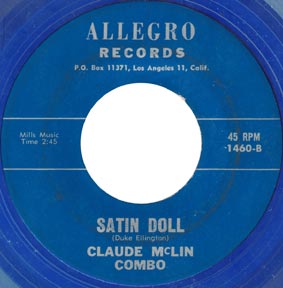
Bob Porter further remarks, "I heard Claude at a joint called The Masque (later The It Club) on West Washington Blvd. in LA about 1960. He sounded good." On February 2, 1961, Claude McLin and drummer Roy Porter appeared in a photo taken between sets at the Masque.
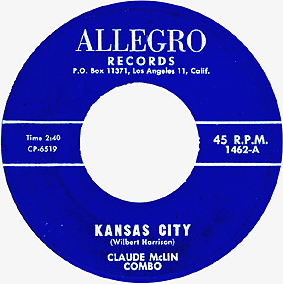
Claude McLin (ts -2, voc -1); unidentified (org); unidentified (eg); unidentified (b); unidentified (d).
Allegro Recording and Music Studio, Los Angeles, 1961
| CP-6519 | Kansas City ("Harrison") -1 | Allegro 1462-A | |
| CP-6520 | The Growler (McLin) -2 | Allegro 1462-B |
Our information on Allegro 1462 comes from a copy of this 45-rpm single in the collection of Dieter Hartmann. It has the familiar blue Allegro label, but is pressed on black vinyl. "Kansas City" is of course the jump-blues standard. Wilbert Harrison, who had the hit with it, is given the composer credit in place of Lieber and Stoller, who actually wrote it. Claude McLin features his vocals instead of his playing on "Kansas City," which includes odd mannerisms (such as neighing like a horse, and stammering, "ubba, ubba, ubba, of 18th and Vine"). Greg McLin identified his father as the vocalist. The flip, appropriately called "The Growler," is a sort of striptease grind in which McLin slightly varies the "melody."
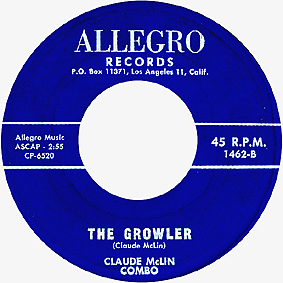
The CP numbers (CP stands for Custom Pressing) indicate that Allegro 1462 was pressed by Rite in Cincinnati in 1961. No Allegro 1461 has turned up, but there is a gap in the release series at that point and a four-tune session would have generated the sides for it.
On April 8, 1961, Claude McLin's group played for a champagne reception and dance put on by The Little Foxes and The Hares, a fashion models' organization. The event at the Beverly Hilton was anounced in the Eagle for March 23. The McLin group again played for dancers at the Filmland Festival put on by the Little Foxes on October 8.
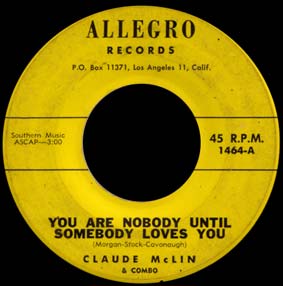
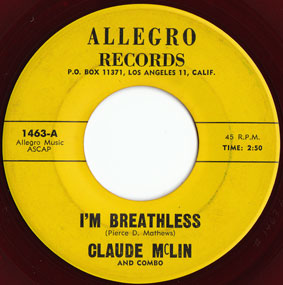
Claude McLin (ts -2, voc -1); unidentified (org- 3, p -4); unidentified (eg); unidentified (b); unidentified (d).
Allegro Recording and Music Studio, Los Angeles, 1962
| 1463-A | I'm Breathless (Matthews) -1, 3 | Allegro 1463-A | |
| 1463-B | Ruff (McLin) -2,3 | Allegro 1463-B | |
| 1464-A | You Are Nobody until Somebody Loves You -1, 3% (Morgan-Stock-Cavanaugh) | Allegro 1464-A | |
| 1464-B | More Than You Know -1, 4% (Eliscu-Rose-Youmans) | Allegro 1464-B | |
| You Go to My Head (Coots-Gillespie) -1, 3 | Allegro 1465 | ||
| When Sunny Gets Blue -2, 3 | Allegro 1466 |
Allegro 1463 sports a yellow label and is pressed on dark red vinyl. It features a vocal from Claude McLin on one side and a tenor sax instrumental on the other. It is strictly an "A and B" release, with no CP numbers. The release was announced in Billboard on May 19, 1962.
Allegro 1464 doesn't have CP numbers either. It has a yellow label and is pressed on black vinyl. In the vinyl 1464-B carries "CAW / Δ E C," the triangle being open at the bottom. There are also the notations "Coot" and "7-2-62" (or is that "1-2-62"?). The release date was probably later in 1962.
Both sides of Allegro 1464 are strictly vocal—no tenor sax. On "You Are Nobody," Claude McLin recites the lyrics, going from slightly pathetic to almost hysterical as he ad libs:
But you can take it from me,On "More than You know," he recites the verse unaccompanied before singing the chorus.
On Allegro 1465, McLin again recites the lyrics. Its flip, Allegro 1466, is a straightahead instrumental, timing out at 4:04.
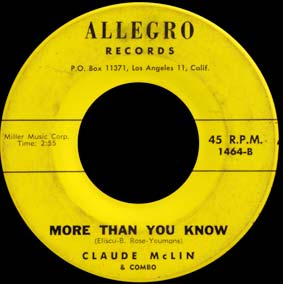
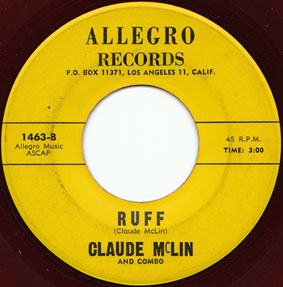
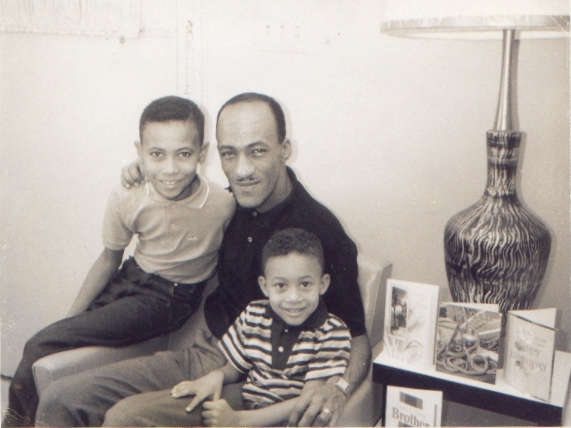
Greg McLin recalls that in the early 1960s his father was usually working 5 or 6 nights a week. During this period his steadiest gig was at the Tropicana Lanes in Los Angeles. The Tropicana was a bowling alley with an attached lounge. A brief item from the Los Angeles Times ("Inglewood Twists," April 15, 1962, Calendar) reads as follows: "The Kon Tiki Lounge of the Tropicana Lanes in Inglewood has started a series of Sunday evening twist sessions. Claude McLin and his swingin' trio start the noiseathon at 7 p.m." He took occasional trips to clubs in Las Vegas or in San Francisco. In 1962 and 1963, Claude McLin also appeared 2 or 3 times on the Lloyd Thaxton Hop, a "Dick Clark type show" on local TV. Local DJ Thaxton started his show on Channel 13 in Los Angeles in 1962. Thaxton was able to get the show syndicated in 1964, but its eclectic mix of rock and roll, folk, and country lacked teen appeal beyond its home base (see http://www.classicthemes.com/50sTVThemes/themePages/lloydThaxtonShow.html) and Thaxton's later TV ventures would be game shows.
Greg McLin also recalls his father experimenting with costumes. "Sometimes he would go to work in a turban; he would get a black suit and a turban with a ruby stud. He had Western outfits, with white and black Stetson hats" (interview, May 12, 2003). Like most saxophonists who had undergone traditional band training, Claude doubled on clarinet; although we have no recorded evidence of his clarinet playing, he did use the instrument on gigs.
During this period, Claude's steady musical work and Jacquelyn's business ventures were making them quite prosperous. The McLins lived in a 4-story house in the View Park area of Los Angeles, complete with a game room and a swimming pool. They owned a Studebaker and a silver 1959 Cadillac convertible.
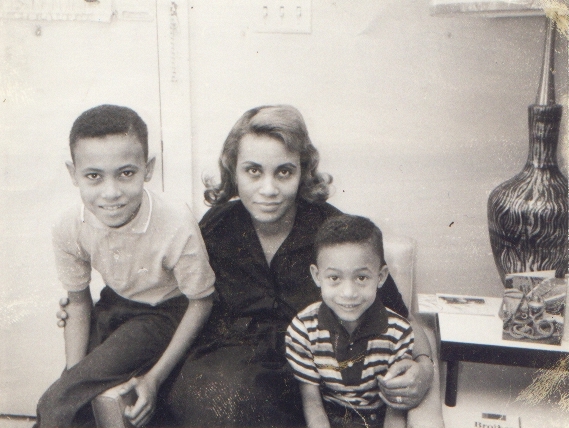
Nonetheless, there was trouble on the horizon as the rock and roll audience grew and the demand for jazz and older styles of rhythm and blues continued to decline. A single like "Kansas City" b/w "The Growler" saw Claude McLin trying out responses to the advent of rock and roll.
On August 4, 1963, Claude McLin and his Quartet again provided the music for the dance that concluded the Little Foxes' annual convention, held at the Golden State Auditorium.
Allegro kept recording in 1963 and 1964, but Claude McLin was no longer on Dunlap J. Cawthron's roster. McLin responded by reviving his Mac-Jac label, putting out a very low-circulation single featuring two new tunes. The record went nowhere sales-wise, but it effectively served as a demo.
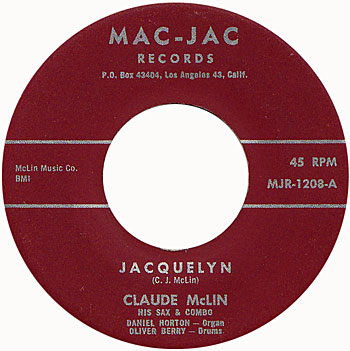
Claude McLin (ts); Daniel Horton (org); Oliver Berry (d).
Los Angeles, prob. 1963
| 1208-A | Jacquelyn (McLin) | Mac-Jac MJR-1208-A | |
| 1208-B | Jambo (McLin) | Mac-Jac MJR-1208-B |
Recently, Armin Büttner discovered a second Mac-Jac release. The company's address has changed, and the recording venue is no longer a professional studio. Most likely Claude McLin and his trio recorded the sides in a club where they were working; the sonics aren't the best and there are audience noises on "Jambo."
These performances are very different from the ones that would follow on Dooto, and not just because "Jambo" is the B side. "Jacquelyn" is strictly instrumental and features a long tenor sax solo that makes it one of Claude's best latter-day jazz performances. "Jambo" has the trademark vocal imitatiions of a Jew's harp, but these are obviously contributed by the organist and/or drummer because the leader plays tenor sax on most of the track. The vocal parts are also undermiked and occasionally hard to hear.
It's doubtful that this 45-rpm single got much distribution. But a copy would have served quite nicely as a demo for Dootsie Williams...
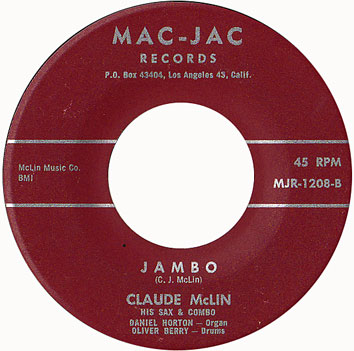
On his last session, for Williams' Dooto label, McLin moved into something more extreme that would take him away from jazz entirely. The company wanted him to record the same tunes in the studio—in strictly rock and roll versions.
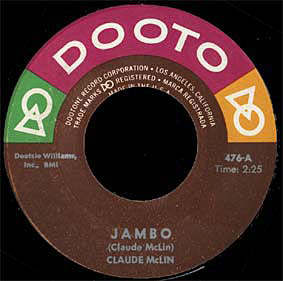
Claude McLin (ts-1; voc -2); unidentified (org); unidentified (eg); unidentified (d).
Los Angeles, 1964
| Doo-476-A | Jambo -1, 2 (Claude McLin) | Dooto 476-A, Ace CDCHD 880, Ace Jambo 001 | |
| Doo-476-A | Jambo -1 (Claude McLin) | Ace CDCHD 880, Ace Jambo 001 | |
| Doo-476-B | Jacquelyn -2 (Claude McLin) | Dooto 476-B |
Our basic session information comes from Lord's Jazz Discography. Lord has just Claude McLin and unidentified others; he gives the label as Dootone (which is what is was called earlier on).
The two released sides are efforts at different forms of rock; according to his son Greg, Claude McLin was responsible for the vocals on both sides. "Jambo" is early sixties garage rock. Going "doing-de-doing" most of the way (OK, that's our transcription!), he sounds like the lead singer from the garage surf band The Trashmen imitating a jew's harp. The tenor sax is heard briefly in the background near the end of the piece, just before the vocals go competely crazy. "Jacquelyn" is a droopy ballad in praise of Mrs. McLin that includes a lot of spoken passages.
The Dooto release was a 45-rpm single, first advertised in Billboard on April 25, 1964. In February 2003 "Jambo" was resurrected on an Ace collection, Great Googa Mooga!, featuring a wide range of vocal numbers with nonsense lyrics, most but not all done in Southern California, and recorded between 1945 and 1965. "Jambo" can thus now be found in the company of "Shimmy Shimmy Ko Ko Bop" and "Rubber Biscuit": http://www.acerecords.co.uk/content.php?page_id=59&release=818 Not only is the instrumental track of "Jambo" (before McLin overdubbed his vocal) also included on the CD, so is a copy of the original lead sheet! (The lead sheet includes syllables like "dairn dairn de doo"... and instructs the singer to imitate a jew's harp.) More recently, Ace put the vocal and instrumental versions of "Jambo" out on a CD single, Jambo 001: http://www.acerecords.co.uk/content.php?page_id=59&release=4727
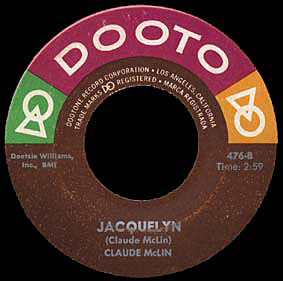
As audience interest in Claude McLin's music began to wane, he was also having trouble at home. In 1964, Claude and Jacquelyn were divorced. For 15 years, Claude would have virtually no contact with his children, who were living with Jacquelyn in far less prosperous circumstances. It is hard not to see the Dooto session as an indication of his declining musical prospects; a jazz musician approaching 40 was hardly going to be competitive with young rock performers on their own turf. Meanwhile across the USA the 1965-1970 period proved extremely hostile to jazz—even in cities with a sturdier scene than Los Angeles—and his opportunities to perform probably dried up entirely. We don't exactly when Claude McLin took a day job and retired from playing; according to Greg McLin his "career with music faded away" after the divorce.
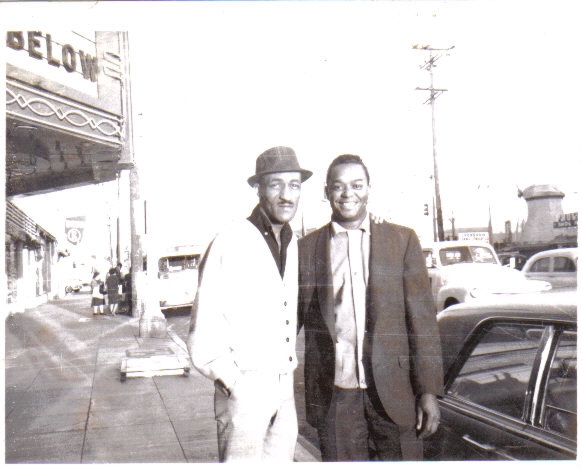
By Fall 1978, Claude McLin was driving a bus for the Avis Rent-a-Car agency at the Los Angeles International Airport (where Bob Porter ran into him and talked to him). He was probably already there in March 1978, when Liz Smith's syndicated column led with "'You got to go out on a limb, 'cause that's where the fruit is," said L.A. bus driver Claude McLin to an actress friend recently. McLin has seen them come and go in the film capital and he can usually tell when they are going to make it" (New York Daily News, March 15, 1978, p. 6). In the early 1990s, he developed congestive heart failure, which sidelined him from his job at times. He renewed his religious commitments in 1993, when his son Greg recalls that he underwent a full-immersion baptism. As his health declined, he finally retired from Avis, dying not long afterward in Los Angeles on July 21, 1995.
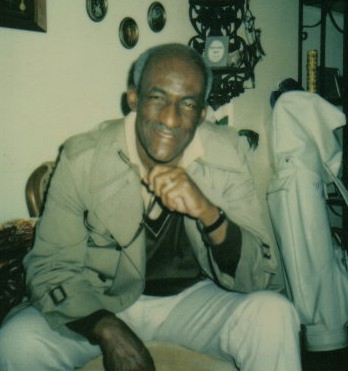
After the divorce, Jacquelyn McLin worked as a legal secretary in the offices of Occidental Petroleum. Later she opened Everybody's Gym and Spa, and became a real estate broker. She died in Los Angeles in 1999.
Jay McLin is deceased. Greg McLin works in corporate security. Marissa Monteilh, as she is now known, is the author of two romance novels, May December Souls and The Chocolate Ship (see http://www.marissamonteilh.com/index.htm). Claude McLin's frequent musical collaborator, Bruz Freeman, eventually retired from music and moved to Hawaii. He died in Boulder City, Nevada, on November 21, 2005.
In 1997 Claude McLin was memorialized on a recording by Luc Houtkamp (tenor sax, with Kent Kessler, bass, and Michael Zerang, drums). Entropy 007, a CD titled Luc Houtkamp in Chicago, includes a number titled "Who Is Claude McLin?" Further pieces on Houtkamp's CD are dedicated to Gene Ammons and Richard Davis, while another commemorates the Pershing Ballroom.
Any further information on this underrated musician would be greatly appreciated. We still listen to Brew Moore, Paul Quinichette, and Wardell Gray; we should be listening to Claude McLin.